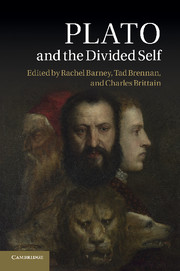Book contents
- Plato and the Divided Self
- Plato and the Divided Self
- Copyright page
- Contents
- CONTRIBUTORS
- Acknowledgements
- Introduction
- Part I Transitions to tripartition
- 1 From the Phaedo to the Republic
- 2 Enkrateia and the partition of the soul in the Gorgias
- 3 The unity of the soul in Plato's Republic
- Part II Moral psychology in the Republic
- Part III After the Republic
- Part IV Parts of the soul in the Platonic tradition
- Bibliography
- Index locorum
- General index
1 - From the Phaedo to the Republic
Plato's tripartite soul and the possibility of non-philosophical virtue
from Part I - Transitions to tripartition
Published online by Cambridge University Press: 05 March 2012
- Plato and the Divided Self
- Plato and the Divided Self
- Copyright page
- Contents
- CONTRIBUTORS
- Acknowledgements
- Introduction
- Part I Transitions to tripartition
- 1 From the Phaedo to the Republic
- 2 Enkrateia and the partition of the soul in the Gorgias
- 3 The unity of the soul in Plato's Republic
- Part II Moral psychology in the Republic
- Part III After the Republic
- Part IV Parts of the soul in the Platonic tradition
- Bibliography
- Index locorum
- General index
Summary
- Type
- Chapter
- Information
- Plato and the Divided Self , pp. 9 - 32Publisher: Cambridge University PressPrint publication year: 2012
- 7
- Cited by

